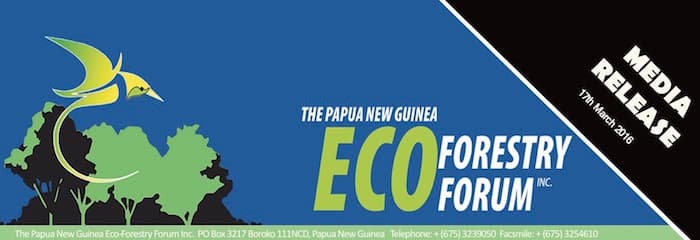Government must seriously address illegal logging

Source: Cosmas Makamet, PNG Eco-Forestry Forum
Deep-rooted problems of corruption and poor forest governance in PNG have continued to be a norm even after the Barnett Inquiry in the 1990s, as have been documented well by researchers, independent reviewers and renowned institutions over the last ten years, yet responsible authorities such as PNG Forest Authority (PNGFA) have failed to address them. Emerging reviews and studies indicate that there is little or no evidence to suggest that logging practices and forest governance in PNG have improved.
Whilst the Government claims that there are no illegal logging practices in PNG in the recent APEC Forest Ministers’ Meeting, and generally in the media telling us that everything is well in the PNG Logging Industry, recent studies conducted by reputable and renowned research institutions such as the Chatham House (based in the United Kingdom) and the Oakland Institute (based in USA) Reports reveal otherwise.
PNG is one of the most socio-culturally diverse countries in the world, home to the 3rd largest forest (together with West Papua), and comprise over 7% of the worlds biodiversity on only 1% of the world’s land mass. This precious wealth of forest resource including its flora and fauna should be sustainably managed and wisely used for the benefit of the current and future generations. The vast majority of people depend on their forest for their well being. It is much more to them than just a source of short-lived timber royalties. Our forest is considered a world heritage and is often under the scrutiny of the world as indicated in numerous reports and studies so far.
The Chatham House has been focusing on PNG being a producer country for timber for a while and its reports of studies conducted in 2014 and 2015 confirm illegalities and a lack of legal compliance in PNG’s forestry sector. Such illegalities include: timber licenses being issued or extended in breach of regulations and without consultation with local landowners, extensive breaches of harvesting regulations by concessionaires, and, the abuse of licenses for clear-felling forest for commercial agricultural plantations known as Forest Clearing Authorities (FCAs).
The Oakland Institute in another shocking report released last month, described incidences of massive tax evasion by foreign logging companies in PNG . The report named logging conglomerates which appear to be complicit in tax evasion amounting to hundreds of millions of kina every year through log transfer pricing, and declaring constant operational loses. This report cited the INTERPOL Environmental Crime Program report 2012 named PNG as a major exporter of illegal timber and confirmed the fact that illegal logging was not on a decline but have become rather more advanced and the cartels more organized making illegal timber marketing a lucrative business.
Both reports also specify the permanent loss of PNG’s forests through logging under the controversial Special Agricultural Business Leases (SABLs) initially intended for commercial agriculture. The studies also revealed that logging expansion in SABL areas now have become the top tropical log exporter in the world, exporting largely to China, which poses serious concerns on the rapid depletion of the forest.
The continuation of serious unlawful practices within the forestry sector pose major concerns and is unbecoming considering PNG’s reputation as a global leader on the REDD+ debate at the international climate change negotiations. This state of affairs warrants the need for immediate action by mandated authorities regarding the application and enforcement of applicable laws and policy to deal with the issue and address corruption.
The PNG Eco-Forestry Forum on behalf of its members, partners and the people in generally would like to endorse the said reports and confirm the sad reality of illegal logging in PNG. The reports uncover massive fraud against the government of PNG and its people of much needed revenues by logging companies, and therefore it is only imperative for the government to acknowledge the report, investigate it further, and prove to the people of PNG their claim that there is no illegal logging in PNG.
We hereby call on the Government not to disregard these reports blindly or to shy away from the enormity of the issue but to meet the challenge and work with all stakeholders involved to rid this corruption for the sake of the people of this country.
The Eco Forestry Forum therefore calls on the Government to;
i). immediately conduct official investigations to verify the nature of the allegations raised in the Oakland Institute Report
ii). Heed facts and recommendations from the said reports and other relevant studies and inquiries undertaken, and address the illegality issue labeled against PNG once and for all.
iii). ensure PNG Forest Authority (PNGFA), Conservation and Environmental Protection Authority (CEPA) and other relevant responsible state line agencies to effectively collaborate and develop synergies to address this issue. Further that they are adequately resourced to administer and enforce all applicable laws and policies regulating and promoting the wise use of forests and the environment, in particular; the Forestry Act 1991, Environment Act 2000, PNG Logging Code of Practice, etc,
iv) take the lead in progressing the work of voluntary global initiatives such as. Extractive Industries Transparency Initiative (EITI), the Open Government Partnerships (OPG) and Forest Law Enforcement, Governance and Trade (FLEGT) etc to ensure compliance in the sector and encourage public or multi-stakeholder participation and insight in government decision making.
v) Ensure a transparent, robust and systemic manner of re- cording, storing and managing information, statistics and other data to ensure appropriate information for future policies and strategies, and make this data publicly available
vi) Implement the recommendations of the SABL Commission of Inquiry (CoI).
